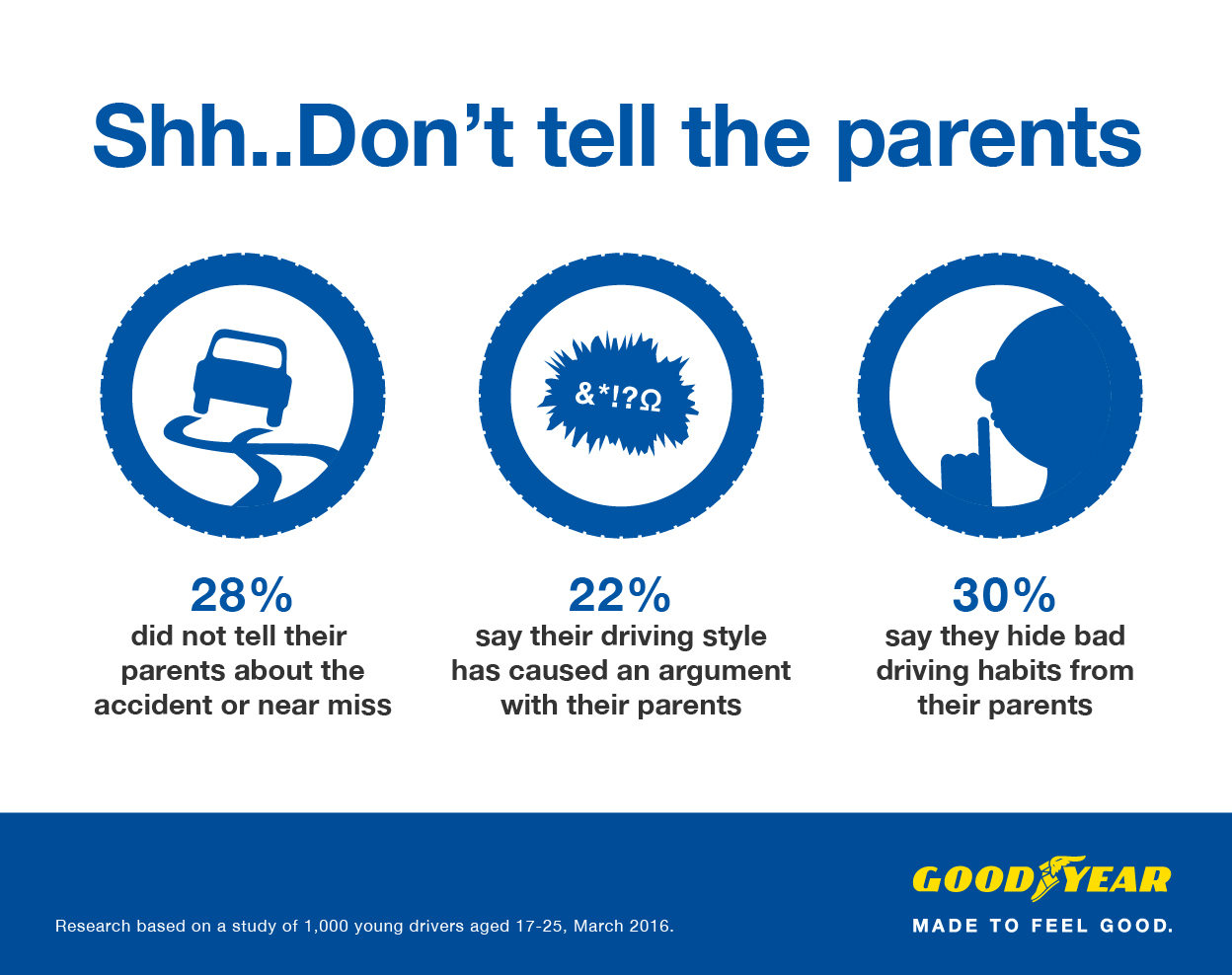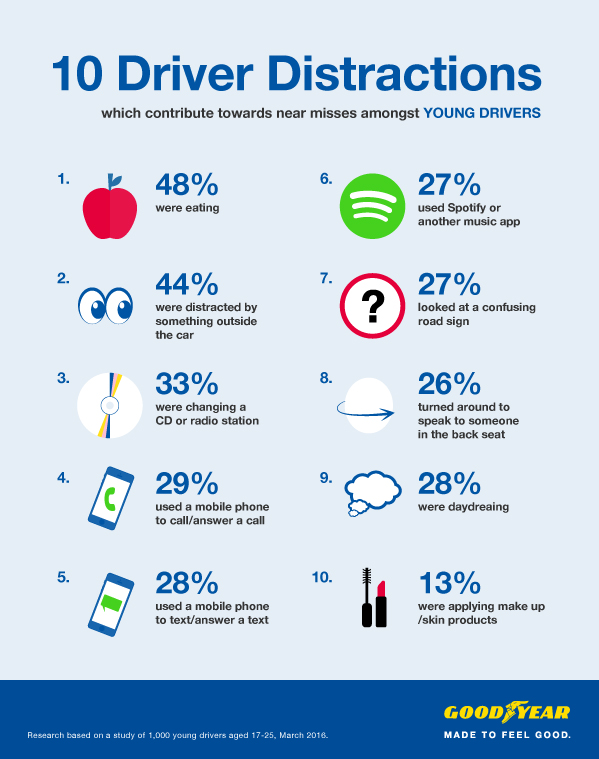Young drivers are at a much higher risk of crashing their cars than older drivers, and 9 per cent of young drivers are involved in serious or fatal crashes where they are the driver.
Almost one in four 18 – 24 years olds (23 per cent) will crash within two years of passing their test, and this figure increases significantly more in young males.
The combination of inexperience and youth puts young drivers at a high risk of crashing their cars. They master new skills quickly, so often feel confident in their driving ability, but because they have a lack of visual awareness and hazard recognition, they are less able to judge appropriate speeds for circumstances. Biological reasons come into play too. New research has revealed that young drivers are more likely to take serious risks behind the wheel such as speeding, over taking, driving under the influence and not wearing seatbelts, because the frontal lobe that helps control impulses isn’t fully developed until your mid-20s.
As part of our focus on improving road safety for young drivers, we recently carried out our own research into young driver behaviour, with startling results:
- One quarter of young drivers have had a near miss or accident in last year due to being distracted at the wheel
- 23 per cent of young drivers aged 17-25 have had an accident or near miss in the last 12 months due to being distracted
- 18 per cent had driven through a red light due to being distracted
- 42 per cent have used a mobile phone at the wheel
- One in ten log into social networks like Facebook whilst driving
We also found that personal grooming is distracting young drivers. Over one in ten (13 per cent) young drivers also admitted to regularly applying make-up or skin products behind the wheel, whilst 11 per cent have styled or brushed their hair.
Distracted At The Wheel
Mobile phone usage is also still prominent in young drivers, despite laws prohibiting their use.
Forty-two per cent of the young drivers we asked aid they have used their mobile phone illegally whilst driving in the past year. Of those, 29 per cent admitted to calling or answering the phone, 28% said they have text a friend whilst behind the wheel, whilst one in ten admit to logging into social networks (the majority being male drivers at 58 per cent).
Forty-five per cent of the latter have searched newsfeeds or updated their status on Facebook. Thirty-two per cent have used SnapChat to interact with friends, and over one quarter (27 per cent) admit to using sites like Spotify or Deezer whilst driving – nearly half (49 per cent) of these users are aged 17-19.

Peer to Peer Distractions
Our study also found nearly a quarter of young drivers say they drive differently with friends in the car, cementing the correlation between peer passengers and poor driving behaviour.
- 23 per cent of drivers aged 17-25 said driving is worse with friends in the car
- A third (32 per cent) said they concentrate less
- 30 per cent said they feel more stressed, stretching to 40 per cent of drivers aged 20-22.
- 30 per cent are more stressed with peer passengers
- 16 per cent admit to speeding to show off, a behaviour more common in male drivers (23 per cent) compared to females (14 per cent)
We noted that a lack in concentration and increased stress levels were the primary factors leading to the poor driving behaviour.
In total, the research found over half (52 per cent) of young drivers said they have been distracted by someone else in the car whilst driving in the past 12 months, with 80 per cent saying that passengers talking to them was the most distracting habit. In addition, nearly a third (31 per cent) of drivers said that they have been distracted by a passenger trying to change the music or radio station, whilst a quarter (26 per cent) said they’ve taken their eyes off the road as the passenger was showing them something on an tablet or phone.
Worryingly, nearly one in five young drivers have said they’ve lost concentration on the road as the passenger was taking selfies of them both. 
Young People As Passengers
But it’s not just young drivers we should worry about. Young passengers are also at risk.
- One in five young people are too embarrassed to speak up if they were a passenger in a car where someone is driving erratically
- 66 per cent have been in a situation where a driver has lost concentration, rising to three in four (78 per cent) people aged 17-19
- Nearly half (51 per cent) of young people said they have been in a car when the driver has used a mobile phone to call or answer at the wheel
- 41 per cent have seen a friend use their phone to text whilst driving
- 39 per cent of young people have seen a driver eating at the wheel, whilst they have been a passenger
When we asked how they feel when in such a situation, 93 per cent of young people said the situation had made them feel anxious or uneasy as the driver was no longer concentrating on the road.
Yet despite this, over a third (41 per cent) said they had not spoken up, or told the driver to stop the action, with one in five (20 per cent) saying they felt too ‘embarrassed’, as the driver was older. Women were found to be more shy then men, with 21 per cent choosing to stay quiet compared to 15 per cent of men.
Seventeen per cent also said they didn’t mention anything to the driver so as not to appear ‘geeky’.
“Peer pressure is a strong influence on young people today, but by not approaching the subject of poor driving, it is putting themselves, the driver and other road users at risk. No one should be made to feel uncomfortable whilst a passenger in any vehicle, whether the driver is older or younger. It’s vital to speak up if you see a driver is distracted, so that we, as a nation, begin to view safe driving as the celebrated way to drive – for all ages – and work to reduce road crash statistics.” – Kate Rock, PR & Corporate Communications Manager, Goodyear Tyres UK
Distracted Driver Case Studies:
Case study: Ben White, 22
Ben, aged 22, from Oxford has been driving for five years, having passed his driving test first time.
“I’ve only ever had one car accident. It was my fault – I was late for work, and was going too fast round a bend. The car just slipped off the road as I couldn’t brake fast enough. The car wasn’t a write-off but it did need some repair afterwards. I told my parents, they weren’t very pleased, and said I should have known better.”
Ben admits to getting distracted at the wheel.
“I do get distracted when I’m driving, although not often and not for very long. Going to work is pretty short distance for me, but it’s when I’m on long journeys that I get bored. The bad habits usually creep in when I have friends in the car, when they talk or mess around, lean across the seats or change the music. I just lose concentration – I’m thinking more about their choice of music and what they’re doing rather than what I’m meant to be doing.”
“I suppose I do also get distracted when I’m just on my own in the car. When I’m changing the radio station, or loading up music on my phone to listen to, that kind of thing. I’ve missed a few road turnings because of that.”
Case study: Andrew Williams, 23
Andrew, aged 23, from Oxford has been driving for four years. He passed his test on the second attempt.
“I’ve had three car accidents since I started driving, and two were my fault. On both occasions, I skidded on ice and crashed. I was just going too fast, and expected the road to be gritted. It wasn’t and I didn’t brake fast enough. The car wasn’t a write-off but it did need some repair after both incidents. I told my parents, my mum panicked and was quite dramatic. She said she didn’t care about the damage to the car, but was more worried about me. My dad wasn’t very pleased, and said I should be going slower.”
Andrew admits to getting distracted at the wheel.
“I can get quite distracted when I’m driving. I sometimes work night shifts, so it’s usually when I’m tired and trying to keep myself awake. Things happening on the roads around me, or pedestrians usually take my focus away from the road. I also spend too long looking at what other drivers are doing behind the wheel, especially if they are chatting away on the phone, when really I should be thinking about what I’m doing.”
“I used to use my phone quite a lot to make calls when I was driving but I don’t do that anymore. My car has Bluetooth so I do still call people, but I use the phone book built into the dashboard controls. I suppose that is quite distracting in itself though as you spend a few seconds looking for the right name to appear and not looking at the road. I also have a bad habit of changing the music on Spotify when I’m driving though – it takes a while to load and when I can’t find a good song, I’m not really looking at what’s ahead of me.”
“My friends also distract me when we’re driving somewhere. They’ll play around with stuff in the car, or try and change the music. They’ll turn it up really loud which can be really off-putting, especially if there’s busy traffic, or we’re in the middle of a city like London. My female friends also have a habit of taking selfies or recording videos whilst I’m driving. It can get really annoying.”
